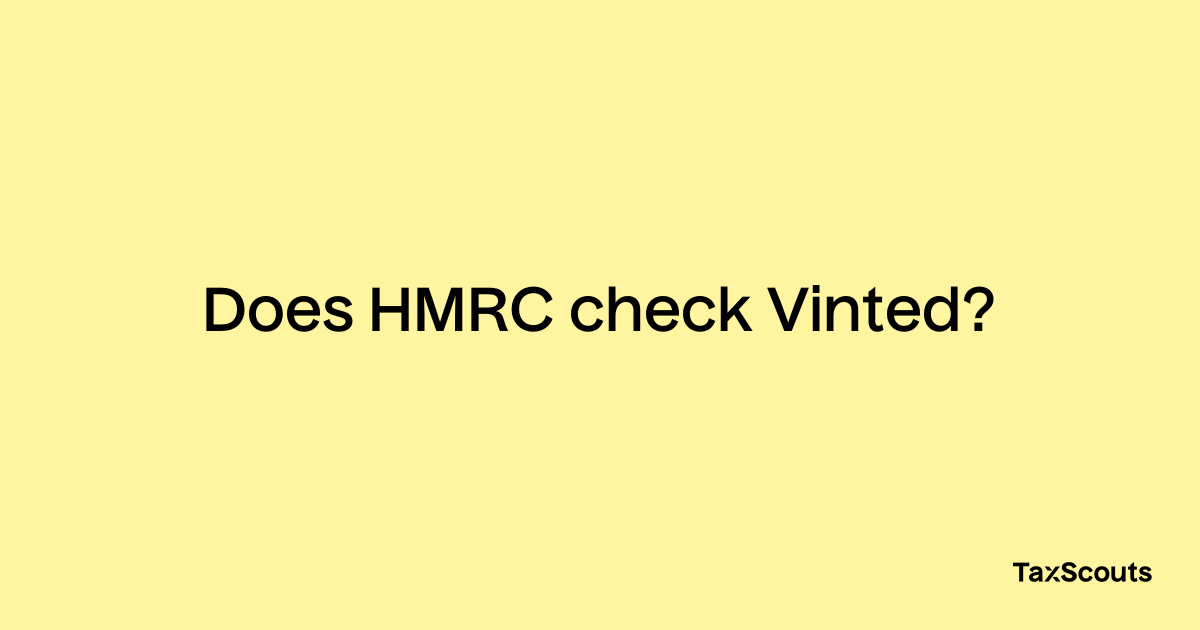Understanding HMRC's Nudge Letters For Online Sellers (eBay, Vinted, Depop)

Table of Contents
What Triggers an HMRC Nudge Letter?
HMRC uses data-matching techniques to compare declared income with information received from online marketplaces. Discrepancies often trigger a nudge letter. Several factors can lead to receiving one:
- Failure to declare income from online sales: This is the most common reason. Many sellers mistakenly believe that small-scale online selling doesn't require tax declarations. However, any profit generated from selling goods online is taxable income.
- Inconsistent reporting of income: Even if you're filing self-assessment tax returns, inconsistent reporting or significant variations between years can raise red flags.
- Suspicion of under-declared income based on data matching from online marketplaces: HMRC receives data from platforms like eBay, Vinted, and Depop. If your declared income significantly differs from their figures, you're likely to receive a nudge letter.
- Lack of filing self-assessment tax returns: Failing to file your tax return altogether is a surefire way to attract HMRC's attention, and a nudge letter is often the first step in their communication process.
It's vital to understand the difference between an HMRC nudge letter and a formal tax investigation. A nudge letter is a proactive measure; a formal investigation is a much more serious matter with potentially severe consequences. Responding promptly and appropriately to a nudge letter is crucial to avoid escalating the situation into a full-blown HMRC tax investigation. Ignoring it is not an option.
Understanding the Information in an HMRC Nudge Letter
An HMRC nudge letter typically includes:
- Specific details about the online sales platform used: This will clearly state whether they have data from eBay, Vinted, Depop, or another platform.
- The period of time covered: The letter will specify the tax year (e.g., 2022-2023) or specific dates during which your online sales are under review.
- An estimate of the income HMRC believes was earned: This is based on data received from the online marketplace(s). It might not be completely accurate, as it may not account for all expenses.
- Clear instructions on how to respond: The letter will detail how and where to provide the necessary information to HMRC.
Carefully reading and understanding all the information provided in the letter is paramount. Make notes, highlight key dates and figures, and ensure you understand the next steps required. Accurate record keeping for your online business is essential for both compliance and peace of mind.
How to Respond to an HMRC Nudge Letter
Responding correctly to an HMRC nudge letter is critical. Here's what to do:
- Gather all necessary records of online sales: This includes transaction histories, profit/loss calculations, and any other relevant documentation proving your income and expenses. Use good accounting practices to organise this.
- Review your existing tax returns for accuracy: Check for any discrepancies between your declared income and the figures in the HMRC nudge letter.
- Contact HMRC directly if you have any questions or need clarification: Don't hesitate to reach out if anything is unclear. It's better to clarify any doubts than to risk misinterpreting the information.
- Consider seeking professional advice from an accountant or tax advisor: If you feel overwhelmed or unsure about how to proceed, professional help is invaluable in ensuring accurate and timely compliance.
Ignoring an HMRC nudge letter can lead to penalties, further investigation, and significant financial repercussions. A proactive and compliant approach is always the best strategy.
Preventing Future Nudge Letters: Best Practices for Online Sellers
Proactive tax planning is key to avoiding future HMRC nudge letters. Implement these best practices:
- Keep accurate records of all transactions: Maintain detailed records of all sales, expenses, and any other relevant financial information. Utilize accounting software designed for online sellers.
- Understand your tax obligations as an online seller: Stay informed about the rules and regulations concerning online sales tax. Use HMRC resources to improve understanding.
- File self-assessment tax returns on time: Always submit your returns by the deadline to avoid late filing penalties.
- Use accounting software to track income and expenses: Accounting software simplifies record keeping and can help you prepare your tax return efficiently.
- Regularly review your tax position: Don't just wait for an HMRC nudge letter; actively monitor your tax liability and make adjustments as needed.
Taking Control of Your Online Selling Tax Obligations
Understanding HMRC nudge letters, responding promptly and accurately, and adopting proactive tax compliance strategies are crucial for online sellers. Ignoring HMRC communications can lead to penalties and potentially significant financial consequences. Review your tax records, understand your obligations, and if you need help, seek professional advice from an accountant or tax advisor specializing in online selling tax. By taking these steps, you can avoid future HMRC nudge letters and ensure you remain compliant with UK tax law. For more information, visit the official HMRC website [link to HMRC website] and consider seeking advice from a qualified tax professional [link to relevant tax advisor websites].

Featured Posts
-
 Bbc To Produce Tv Series Based On Agatha Christies Endless Night
May 20, 2025
Bbc To Produce Tv Series Based On Agatha Christies Endless Night
May 20, 2025 -
 Projet D Adressage D Abidjan Comment Identifier Les Numeros De Batiments
May 20, 2025
Projet D Adressage D Abidjan Comment Identifier Les Numeros De Batiments
May 20, 2025 -
 Ivoire Tech Forum 2025 A Abidjan Opportunites Et Defis De La Transformation Numerique
May 20, 2025
Ivoire Tech Forum 2025 A Abidjan Opportunites Et Defis De La Transformation Numerique
May 20, 2025 -
 Eurovision 2024 Louanes Participation Confirmed
May 20, 2025
Eurovision 2024 Louanes Participation Confirmed
May 20, 2025 -
 The Typhon Missile System And The Shifting Geopolitical Landscape In The South China Sea
May 20, 2025
The Typhon Missile System And The Shifting Geopolitical Landscape In The South China Sea
May 20, 2025
Latest Posts
-
 Balikatan Military Exercises Philippines And Us To Conduct Large Scale Drills
May 20, 2025
Balikatan Military Exercises Philippines And Us To Conduct Large Scale Drills
May 20, 2025 -
 Philippines Us Military Exercises Balikatan To Feature Expanded Drills
May 20, 2025
Philippines Us Military Exercises Balikatan To Feature Expanded Drills
May 20, 2025 -
 Explore Burnham And Highbridge History Photo Archive Grand Opening
May 20, 2025
Explore Burnham And Highbridge History Photo Archive Grand Opening
May 20, 2025 -
 2032 Au Cameroun Macron Face Au Debat Sur Le Troisieme Mandat Et Un Possible Referendum
May 20, 2025
2032 Au Cameroun Macron Face Au Debat Sur Le Troisieme Mandat Et Un Possible Referendum
May 20, 2025 -
 Enhanced Balikatan Exercises Philippines And Us Strengthen Military Cooperation
May 20, 2025
Enhanced Balikatan Exercises Philippines And Us Strengthen Military Cooperation
May 20, 2025
